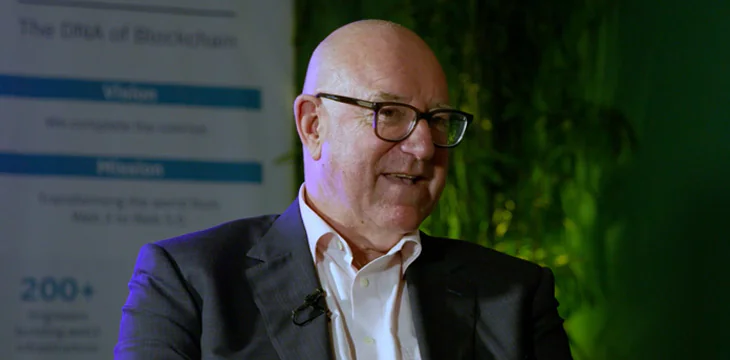
|
Getting your Trinity Audio player ready...
|
As the Philippines embarks on a path to digital transformation, government agencies and various organizations are looking in to blockchain technology as a tool to help the country achieve its goal.
Shortly after Ferdinand “Bongbong” Marcos Jr. was inaugurated as the 17th president of the Philippines in 2022, his administration announced its desire to streamline government services with the use of new technologies.
In response to the government’s call, the province of Bataan hosted its first blockchain conference in October. The event was attended by local and international blockchain leaders, as well as government officials from the Department of Information and Communications Technology (DICT)—the agency tasked by the president to implement digitalization in the country.
With the aim of putting forward blockchain services to government and businesses, nChain, a global tech company that offers blockchain solutions and products, participated at the event. As Stefan Mathews, nChain co-founder and executive chairman tells Claire Celdran in this episode of CoinGeek Conversations, what followed after the event was a series of talks between nChain and the local government of Bataan that resulted in a memorandum of understanding between the two parties to establish a digital platform for the province to streamline current systems and procedures of government services.
“During the event and several meetings afterwards, I had some fairly deep conversations with Governor Garcia and Congressman Garcia and their vision for this technology and the application of it in government is second to none. I mean, they are very, very progressive thinkers,” Matthews said.
Bataan is poised to become the country’s blockchain hub due to its special economic zone status. Nonetheless, Matthews notes that Bataan’s freeport status is irrelevant to nChain’s objective.
“The reason we’re there is the technology and the opportunity to do things with the technology that benefits the province but also benefits the country,” Matthews said.
Coincidentally, Matthews has been residing in Bataan for nine years. He believes Bataan is a natural fit for blockchain activity.
With the aim of forming partnerships and strengthening relations, nChain recently embarked on a series of meetings with government officials, financial institutions and a top university in the country. As a result of these initiatives, nChain has formed a partnership with Ateneo de Manila University in delivering blockchain education to its students.
“We will be working with faculty staff to train them on the delivery of blockchain courses, blockchain material… we will be sponsoring or providing grants or funding projects for three PhD students at the university to extend their research in blockchain here in the Philippines, which also includes making available the entire intellectual property portfolio of nChain for students… and finally, there is the internship issue, we want to provide internships both in our companies and in terms of what we’re doing in Bataan for university students to be able to complete their education,” Matthews said.
On top of the work nChain is doing with Ateneo de Manila University, Matthews also announced the company’s plan to launch a Block Dojo incubator in Bataan. Matthews says the initiative goes hand in hand with their aim to “foster Filipino innovation in the building of solutions on the blockchain that will be deployed domestically, but also potentially, internationally, it also allows us to contribute to possibly uncovering a Filipino unicorn.”
Perhaps one of the most memorable parts of nChain’s recent activities was Stefan’s meeting with Philippine President “Bongbong” Marcos. As Matthews says, the casual conversation which took place over lunch at the presidential palace covered a number of topics pertaining to the delivery of blockchain services in Bataan and whether it can be replicated from province to province or on a national level. More importantly, Matthews mentions the main takeaway from his conversation with the President saying, “He’s very watchful of what’s happening in Bataan and wants to be kept updated and therefore, I think we’re obligated to do a good job.”
It’s also good to note that Matthews’s meeting with Bataan Governor Jose Enrique Garcia and his team has yielded positive results. Matthews says the talks involved “the serious part of defining what the first rollout of a blockchain application will be in the province,” and he was keen to point out that the governor’s timeline is aggressive. Nonetheless, Matthews and the Bataan team tasked to work with nChain have come to an agreement to heed to the governor’s request.
“We would hope that we can have some prototypes in front of these people in first quarter of next year. Now, when [Governor Garcia] heard that, he was very happy… that is the type of timeframe that that he wants to see,” Matthews said.
nChain also met with DICT Secretary Jonathan Ivan and his team. According to Matthews, the topics of discussion revolved around blockchain and the applications being built for Bataan, and they also talked about the sovereignty of government data and whether data stored on blockchain is private or accessible to others.
Overall, nChain’s activities in the Philippines create more opportunities for both the company and the country, taking into account the benefits that the Bitcoin SV [BSV] blockchain technology can do for Filipinos. As Matthews says, the advantage of using BSV technology is that it offers characteristics that other blockchain’s don’t, and those are “scale, cost, security, legal structure.”
Hear the whole of Stefan Matthews’ interview in this week’s CoinGeek Conversations podcast or catch up with other recent episodes:
You can also watch the podcast video on YouTube.
Please subscribe to CoinGeek Conversations – this is part of the podcast’s new series. If you’re new to it, there are plenty of previous episodes to catch up with.
Here’s how to find them:
– Search for “CoinGeek Conversations” wherever you get your podcasts
– Subscribe on iTunes
– Listen on Spotify
– Visit the CoinGeek Conversations website
– Watch on the CoinGeek Conversations YouTube playlist

 11-10-2024
11-10-2024 


